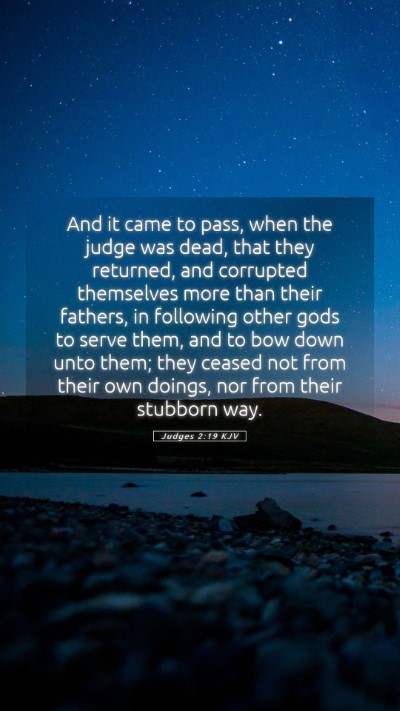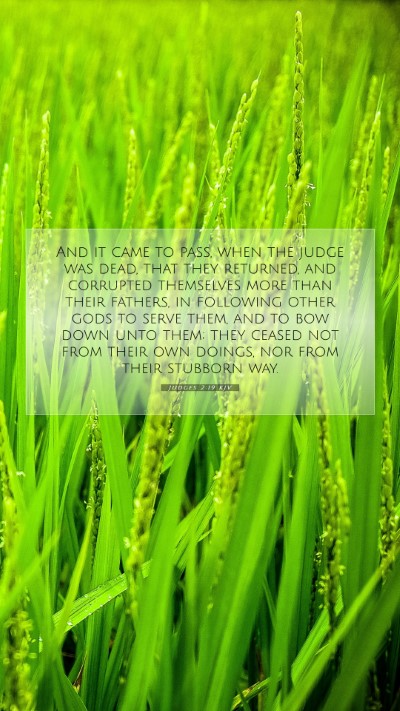Old Testament
Genesis Exodus Leviticus Numbers Deuteronomy Joshua Judges Ruth 1 Samuel 2 Samuel 1 Kings 2 Kings 1 Chronicles 2 Chronicles Ezra Nehemiah Esther Job Psalms Proverbs Ecclesiastes Song of Solomon Isaiah Jeremiah Lamentations Ezekiel Daniel Hosea Joel Amos Obadiah Jonah Micah Nahum Habakkuk Zephaniah Haggai Zechariah MalachiJudges 2:19 Meaning
What is the meaning of Judges 2:19?
And it came to pass, when the judge was dead, that they returned, and corrupted themselves more than their fathers, in following other gods to serve them, and to bow down unto them; they ceased not from their own doings, nor from their stubborn way.
Judges 2:19 Bible Verse Meaning
Understanding Judges 2:19
Judges 2:19 states: "And it came to pass, when the judge was dead, that the people returned and corrupted themselves more than their fathers, in following other gods to serve them, and to bow down unto them: they ceased not from their own doings, nor from their stubborn way."
Bible Verse Meanings
This verse encapsulates a recurring theme in the Book of Judges: the cycle of sin, oppression, repentance, and deliverance. The Israelites, once delivered by a judge, quickly revert to their sinful ways upon their leader's death. This showcases human frailty and the tendency to drift away from God in times of peace and stability.
Interpretation from Public Domain Commentaries
Matthew Henry's Commentary:
Matthew Henry emphasizes the disappointment of God's people: despite witnessing divine intervention through the judges, the Israelites returned to idolatry. He argues that their spiritual decline happened not immediately but as they lost the influence of their leaders. This highlights the danger of relying solely on human leaders rather than on God Himself.
Albert Barnes' Commentary:
Albert Barnes points out the cyclical pattern in the Book of Judges. He identifies how the people's actions after the judge's death reveal a deeper spiritual problem — a heart turned away from God. Barnes notes the phrase "they ceased not" indicating a persistent pattern of rebellion against God despite their previous experiences of deliverance.
Adam Clarke's Commentary:
Adam Clarke focuses on the term "corrupted themselves," explaining that the leaders of Israel had failed to establish a lasting change in the hearts of the people. Clarke argues that the decline into idolatry is a profound warning about the importance of sincere faith over mere outward compliance with religious leaders or traditions.
Application and Significance
The significance of Judges 2:19 extends beyond ancient Israel. It serves as a reminder for contemporary believers of the risks of complacency in faith. Without regular engagement and a personal relationship with God, even the most faithful can be led astray.
This verse is relevant for Bible study groups and individuals seeking to understand the historical context of Bible verses. It provides insights into the cycle of sin and the need for adherence to God's Word, which is essential for personal and communal spiritual health.
Learning from Judges 2:19
- Beware of Complacency: The narrative warns against spiritual complacency and highlights the necessity of continuous faithfulness.
- The Role of Leadership: It underscores the importance of strong, godly leadership as a stabilizing influence for maintaining faith.
- Turning Back to God: It encourages a culture of repentance and seeking God actively, rather than only in times of distress.
Bible Cross References
- Deuteronomy 31:16-18 - God warns about the future disobedience of Israel.
- 1 Samuel 12:25 - Samuel warns the people about choosing their own ways over God’s.
- Romans 1:21 - Describes the rejection of God's truth and consequences for humanity.
Conclusion
In summary, Judges 2:19 serves as a vital teaching point in Bible verse explanations. It challenges readers to reflect on their own faith journeys and the influences that shape their spiritual lives. Understanding such passages through diligent Biblical exegesis and scripture analysis is imperative to grasp the meaning of Bible verses in their entirety.


